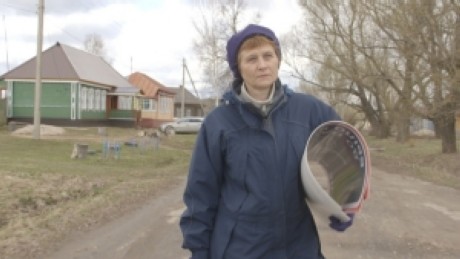


Tatyana Soboleva: The Russian Way

”After twenty years abroad, Natalya comes back to Russia and tries to change the life in her native village by using Western experience, but the authorities don’t want that and the villagers fear them.”
This brief description is connected to the vimeo link sent to me by Tatyana Soboleva, whose film was premiered a couple of days ago in Moscow. A film that Soboleva has worked on for years with dedication and stubbornness
like her protagonist, who wants change as a true activist on a pretty difficult mission to say the least, in the village Norino. Going from door to door Natalya collects signatures in order to approach the authorities, personified in Detkin, who is briefly seen in the film at a gathering, where the wonderful fatherland Russia is song about and where Natalya is praised for her activities, leaving the meeting sad as she got no chance to address the audience. Together with her companion Mikhail, who later that day – a text is saying on the screen – on the order of Detkin – is arrested for not being long enough in Russia. Would have love that theme to be a bit more developed.
But the activities… Natalya protests to the cutting down of the forest. She organises cleaning up of trash and garbage that visiting people have thrown in nature. With a few villagers helping. She wants the road going through the village to be paved. And she donates out of her own pocket a medical station.
She is not alone and the scenes from the meetings held in her beautiful wooden house are caught by the camera of Soboleva. Marina and Nikolay are with her as is Oksana, who is to take care of the medical station if I got it right. Marina is a powerful, charismatic character who comments on Natalya’s letter to Detkin and the authorities – “be short and concise”. She is also the one, who has taken care of the collect of money for getting a container to fill up with the garbage. Until a meeting where her husband says that his wife whould not collect and have the money with her. “She’s freaking out”. In the house at the meetings is also Mikhail, who has such a wonderful face sitting there saying nothing being the one driving Natalya around. Their relationship is close and warm – and as the film full of respect and an eye for situations that can illustrate how life is in a remote village, where the car with bread stops at nighttime to sell to the inhabitants.
It’s Natalya’s native village, she wants “to give back” but as an academic living abroad for decades, she does not really fit in any longer as Marina is saying in a scene – and her outsider position is strongly underlined by Tatayna Soboleva, who with her camera films Natalya, who is taking photos with her cellphone. Documenting life. Two observers, the director and the protagonist, depict, in a non-aggressive melancholic tone a piece of life in a place called Norino in Russia.
PS. It’s not easy to make films in Russia if you are a director like Tatyana Soboleva with a “documentary heart”. I was told by her: The film is supported by Current Time TV and if it is to be shown in Russia it has to be marked as “an organization performing the functions of a foreign agent”.!!!!!!